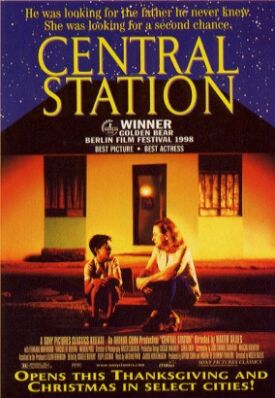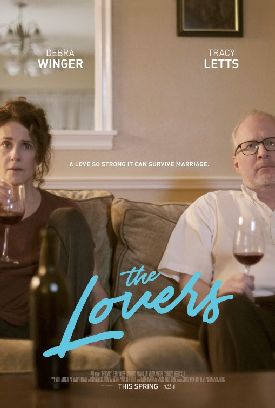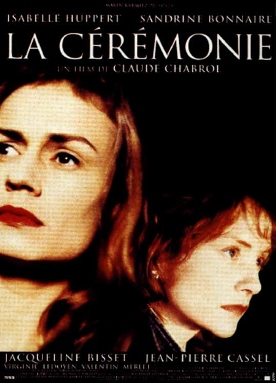Central Station
Central Station, a Brazilian film directed by Walter Salles, stars the marvelous Fernanda Montenegro as Dora (real name, Isadora Teixera) a retired schoolteacher who makes her living by writing letters for illiterates who stream through the main train station in Rio de Janeiro. Many of the letters she simply throws away, knowing that the hopeless Brazilian post office will get the blame if they never arrive. One of her clients is the mother of the charming nine year old Josuë (Vinicius de Oliveira). She writes to the boy’s father, Jesus, that “you’re the worst thing that ever happened to me.” Then she changes her mind and writes hopefully of coming to join him in the remote town where he lives, Bom Jesus. Dora will send neither letter, but let them “stay in that purgatory” of her bureau drawer “for years.”
But then the mother is flattened by a bus in the street next to the station and Dora, who had found herself taking an instant dislike to Josuë, is suddenly his only living acquaintance among the teeming millions of Rio. She reluctantly takes him home with her and finds she likes him even less, though her somewhat slutty neighbor Irene (Marilia Pêra) is throughly charmed. When the boy turns up his nose at the meal she has prepared for him, Irene apologizes: “It’s just that his mother’s cooking was better.”
“No,” says the boy, “she was a lousy cook too.”
He wants to go to his father in the distant town, which Dora tells him is “thousands of kilometers away, on another planet.” Instead, she takes him to a man who promises to have him adopted by a rich family in the United States and accepts a $1000 finder’s fee, with which she promptly goes off and buys a new television set. But her conscience bothers her, and Irene makes things worse by filling her head with all sorts of ideas about what the child-broker is really up to. “Don’t you read the papers?” she says. “These children are killed and their organs are sold.” At last she returns and, more or less on impulse, kidnaps Josuë away from the man who obviously has no benevolent intentions toward him and shouts death threats against her as she makes her escape.
Thinking it best to leave town for a while, she reluctantly agrees to take a bus with the boy toward the distant town where his father is supposed to live. The relationship between this odd couple is strained by mistrust on both sides, and Dora is very far from being maternal in her attitudes, but eventually they can hardly avoid talking and getting to know each other better, even in such exchanges as when Josuë asks her what is a kilometer. She tells him it is 1000 meters.
“I know, but how do they count them?” he asks.
She pauses to think for a moment, then says: “They make it up.”
Before long, however, she is telling him about her own childhood. She sees Josuë’s reportedly alcoholic father as being like her own: “a saint in the house and a p**** outside.” So great a p**** was he outside, in fact, that she says she was known as “Dildo’s daughter.” Her father said he was “tired of riding the same bus every day—meaning my mother—and was going to take a taxi—meaning another woman. But she took a taxi too—a space taxi. She died when I was your age.”
Dora tries to leave the boy asleep on the bus, while she escapes and buys a ticket back to Rio. But the boy gets off too and also leaves his backpack on it with the conscience money she had left for him. Now they have no money and she can’t even cash in the ticket to Rio she bought. They are offered a lift by a kindly evangelical truck driver called César (Othon Bastos). Dora mistakes his kindness for romantic interest, and Josuë begins to be jealous. He tells her that “You’re so ugly, no one will marry you. You look like a man and don’t even paint your face.” To César he says “Did you know that in Rio the women all have sex before marriage. All the women”—trying to discourage the man’s supposed romantic interest.
He needn’t have bothered. César panics and beats a hasty retreat and the two of them are once again left on their own, Dora having put lipstick on for perhaps the first time in her life. “You look prettier with lipstick on,” Josuë tells her consolingly.
They finally arrive at Bom Jesus. It consists of vast, ugly and unpleasant tracts of cheap houses. They don’t find the boy’s father at the address on the letter and are directed to another house he is said to have won in a lottery and then drunk away. They finally reach a dead end, with no money, and Dora cries out in exasperation: “What did I ever to do to God to deserve this? You are a curse,” she tells him. But he comes up with the way out of their dilemma. She will write letters for the peasants who have come to the religious festival in which they now find themselves. He acts as barker and agent and attracts many customers. Soon they have enough money for a hotel room. She jokes with him about never having seen a naked woman.
By this time a bond has formed between the two of them, and when they find not the father but Josuë’s two grown up brothers it is painful for both to realize that she has served her purpose. There is no easy happy ending, but both are left, as we are, with the sense that somehow it has been worth it, in spite of the pain that learning to love entails.
Discover more from James Bowman
Subscribe to get the latest posts to your email.








